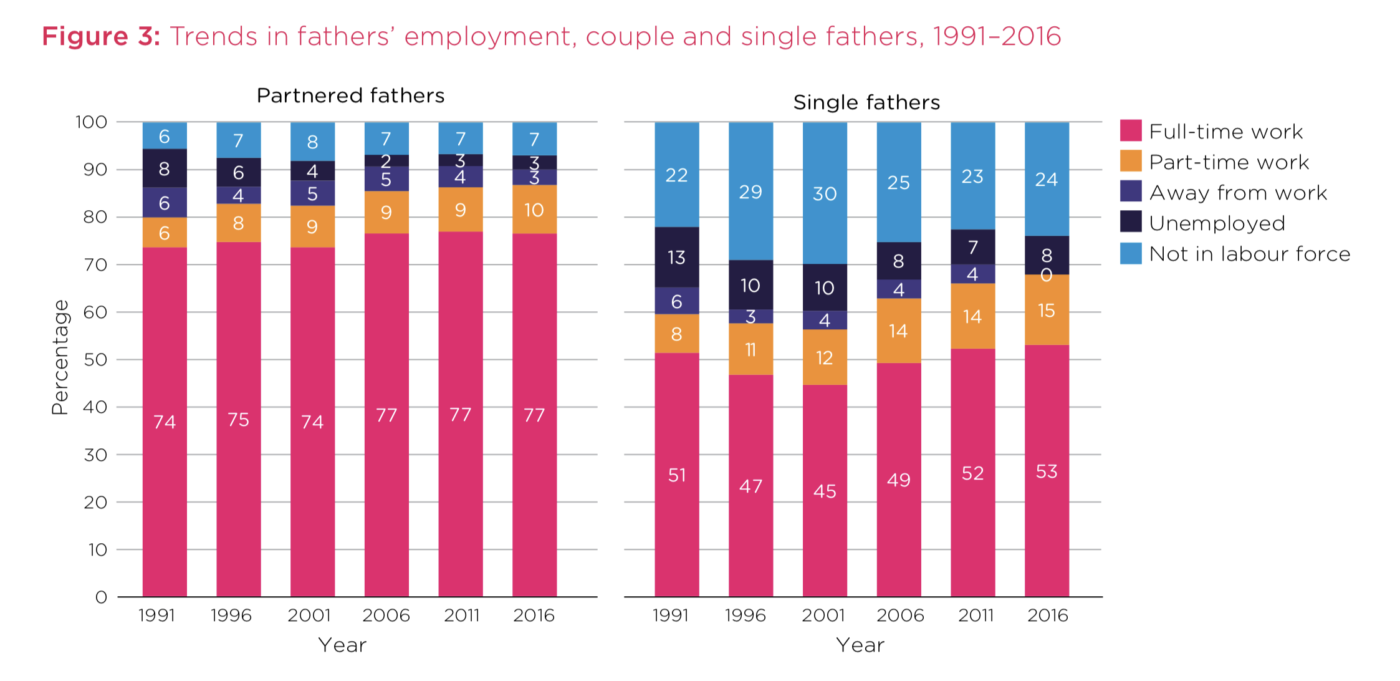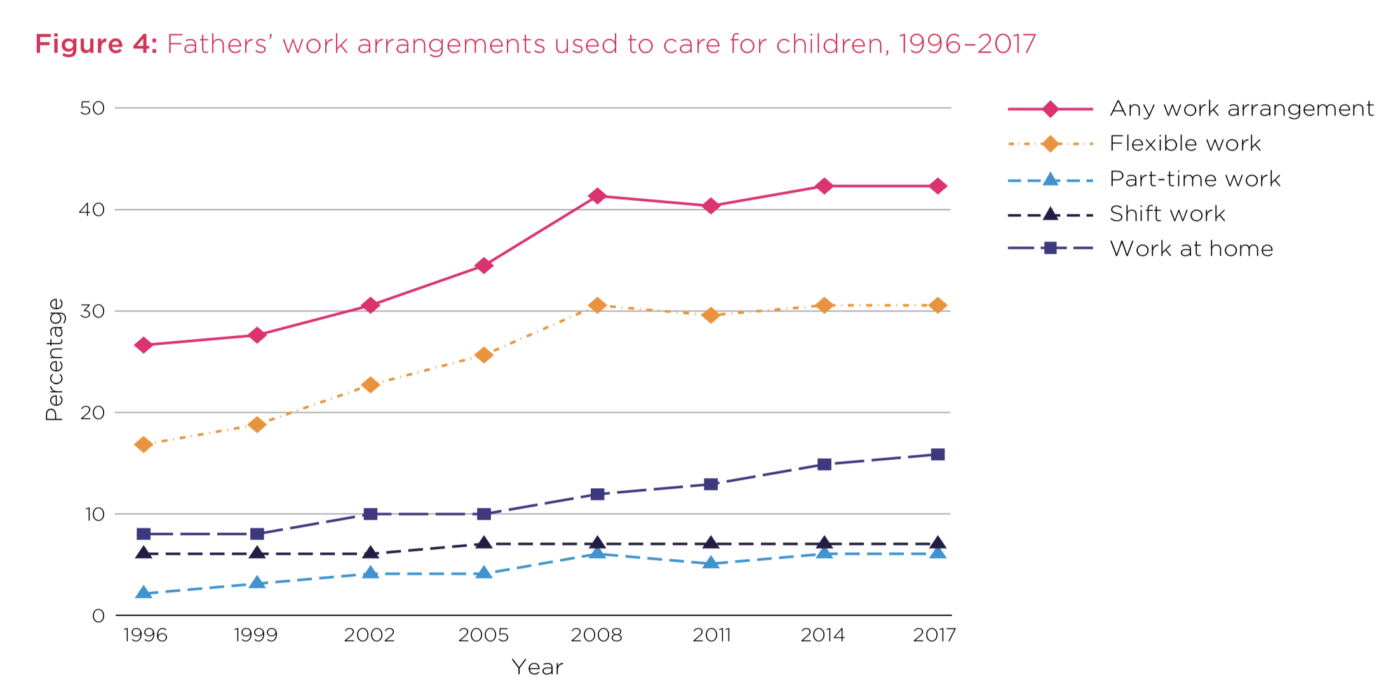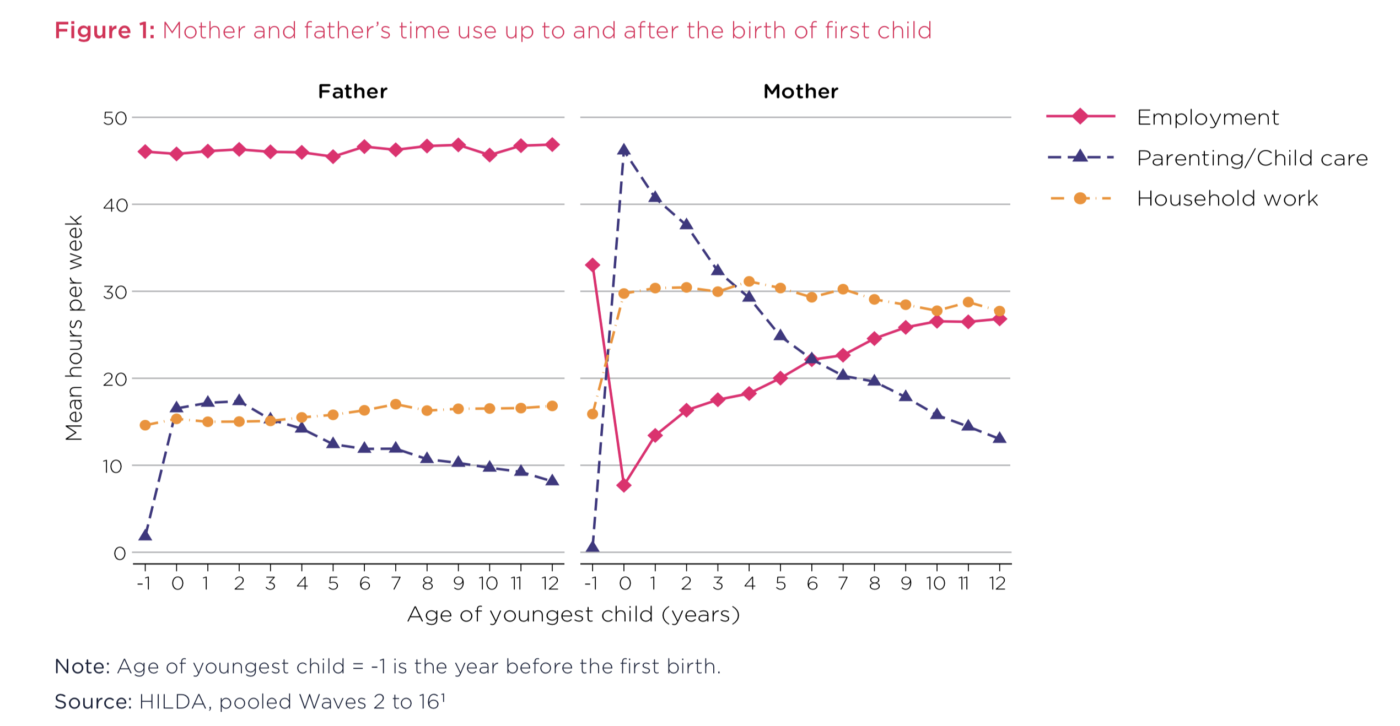Research shows feelings about paternity are changing, but attitudes towards work aren’t.
Fifty-eight per cent of working dads often feel guilty that they don’t spend enough time with their children, according to Expecting more than a baby, a report by global coaching consultancy Talking Talent. It also found 75 per cent of working dads agree that fathers of this generation want more involvement in their children’s care and upbringing.
Despite this guilt and desire, they are not taking more time off work. The Federal Government’s Australian Institute of Family Studies’ report Fathers and Work shows that since 1991, the employment for men with children has been remarkably steady.

Source: Australian Institute of Family Studies
As the report puts it, “In Australia, fathers may request to work part-time hours, as a flexible work option, to assist in the care of children. However, they rarely do.”
But part-time is just one option. Surely in this era of flexible work father’s are taking advantage and adopting more of a childcare role while holding a full-time job? No. Here too, many men aren’t acting according to their own wishes.

Source: Australian Institute of Family Studies
Flexible work did not really move from 2008 to 2017, and working from home has increased by less than 10 per cent since 1996. In fact, a different part of the report that looks solely at full-time workers shows that working from home and flexible work has slightly decreased since 2011 (by three per cent for each).
Anecdotally, I know plenty of men who love their children more than anything else in this world – work is not even in the affection competition. But not one of them has taken significant time off work since the birth of their first child. Their female partners, on the other hand, have.
The data backs this up too.

Source: Australian Institute of Family Studies
While the most dramatic shift here is the mother’s increase of nearly 50 hours of parenting and 12 hours of household work, combined with a drop to less than 10 hours of employment, it is still worth paying attention to what’s happening to fathers. There are no drops for them at all, their first child means parenting but no less work.
The data is proof of the idea that a culture many treat as dying, if not dead – women as homemakers and men as breadwinners – remains a reflection of modern life. When a child comes into the home, men keep working the same hours and women work less in order to spend around 75-80 hours a week on parenting and household work.
And this is not just a reaction to the physical realities of pregnancy – where women take time off to do the actual birthing and then breastfeeding. It takes a full 12 years after they first have children for women’s employment hours to get to pre-children days.
As HRM has previously written, this is a bigger deal than how parents are spending their time. As explained in that article, a study shows that a huge part of the gender pay gap is from childcare, and other research suggests men’s health and happiness is better when they spend more time with their family.
Other factors
The most obvious answer for why men would want to take time off but aren’t is that they are afraid it will hurt their careers, which will hurt their families.
This fear exists, but it’s not felt by the majority. According to the Talking Talent report, only 39 per cent of working dads agree that those who take extended parental leave find it has a detrimental effect on their careers. And only 43 per cent say that fathers who take such leave experience unfaourable comments, discrimination or judgement.
There are other factors which organisations can do more about. Forty-two per cent of those surveyed (men and women) felt there was a significant gap between what their workplace says it’s doing about parental leave and what it’s actually doing. And a large minority of both men and women were dissatisfied with the amount of parental leave they had available.
Plenty of organisations are aware of this, and have generous policies that help both men and women to become parents and care for their children. But changes in a few organisations aren’t enough to tip the balance.
Because if a lot of men want to take time off work and aren’t afraid to do so, why don’t they? The answer might be our society has a particular view of childcare that we tend to follow without much regard for our individual desires. We don’t judge others, but nor do we want to be the other.
How do you broach it with your partner, family and friends? Who wants to be the one father who isn’t getting promotions? Or the one mother who isn’t across every detail of their child’s upbringing? It’s hard to bite the bullet and be different.
The lingering question
Framing the difference between mothers and fathers is fraught. Some have looked at data like what’s in this article (including the very high rates of women in part-time work) and concluded there is a motherhood penalty.
The issue isn’t whether mothers experience career setbacks that fathers avoid – the evidence is clear that they do. The issue is the word “penalty”. Is it a bad thing? People will answer this differently. Certainly the seeming lack of choice feels like an injustice, especially when you take into account the cost to long-term financial independence. But does the majority of Australia really want this to change?
Because if we do, if we want a world with a smaller gender pay gap – where there is a ‘fatherhood penalty’ alongside the ‘motherhood penalty’ – then dads are going to have take an equal share of the childcare responsibilities.
That could mean everybody takes more time off work (and we change how society thinks about work) or it could mean that men spend less time on their careers so women can spend more. Either way, something significant has to give.
So, what do we want?


I think people who conduct this type of research always negate one important fact. Men will always survey as wanting to spend more time with children, who wouldn’t? The reality is that biologically, women, on average , desire to spend more time with their offspring then men. No one should be guilty of this, it happens in the majority of species on earth. When it comes to a choice between spouses and the necessities of life – such as providing for your new family – the person who earns the most will more likely remain at work. I don’t think… Read more »
Good points Bradley. I would like to add that I know many women who earn more than their male partners, yet biologically if they choose to breastfeed as is recommended by WHO, generally they do need to be the one to take parental leave as the primary carer, regardless of whether they would actually prefer to return to work as the main income earner or whether the male partner would prefer to be the stay at home dad. Having a “Primary Carer” is one critical policy point that if removed I believe would help turn the tide on gender equity… Read more »
I have just gone back to work after 6 weeks parental leave (to recover from my c-section) and my husband is the primary carer. His company allows for this in their parental leave policy, as does mine, however it’s certainly not easy. Do I feel a ‘penalty’ in a way, yes. Do we get raised eyebrows, yes – both about me going back to work and him caring for our newborn. Does it work for us? We’re making it work, he is doing an amazing job – first time caring full time for a newborn which we all know is… Read more »
As a CEO father of 2 I love these discussions and can agree with the data, but note it’s 1 way. Where is the data asking how much more dad’s are doing at home? Personally I certainly feel stretched trying to achieve my perception of social stigma’s in being a provider for my family, whilst at the same being the “new age dad” by sharing the cooking / cleaning and childcare duties. I am an absolute warrior for gender equality and I firmly believe that to achieve this we need to change the rules on both sides of the equation.… Read more »
No thanks – we want you to leave us (men and women) alone and let us be ourselves without the PC hash! Pun intended.